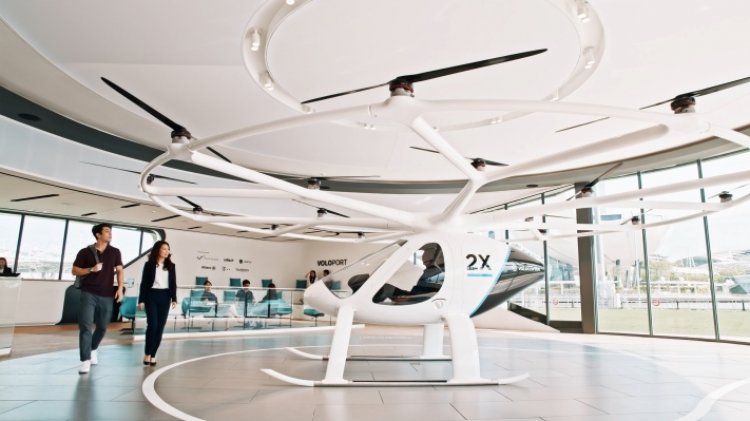Volocopter raises $170M, now valued at $1.87B, to fuel the first commercial launches of its flying taxi fleet
Volocopter, the startup out of southern Germany (Bruchsal) that has been developing electric VTOL (vertical take-off and landing) aircraft and a business model for operating them in taxi-style fleets in urban areas, has picked up another big round of funding as it inches closer to its first commercial launches. It has raised $170 million, funding […]

Volocopter, the startup out of southern Germany (Bruchsal) that has been developing electric VTOL (vertical take-off and landing) aircraft and a business model for operating them in taxi-style fleets in urban areas, has picked up another big round of funding as it inches closer to its first commercial launches. It has raised $170 million, funding that it said it will be using to kick off its first air taxi services, which it noted in an announcement would be “in cities like Singapore, Rome, and Paris.”
The money is part of a Series E, and Volocopter describes it at a first closing made at a pre-money valuation of $1.7 billion, which works out to a post-money valuation of $1.87B. I’ve asked what its target is for the full Series E and any other details it can share on the timing and will update as and when I learn more.
This first tranche is being led by WP Investment, a new backer of the company from South Korea, with strategic investor Honeywell (also a new investor), previous backers Atlantia, Whysol, and btov Partners, and other unnamed existing investors also participated. It has raised $579 million in total to date, and other investors include Geely, Mercedes-Benz Group, Intel Capital, and BlackRock.
Volocopter made a big mark in the autonomous vehicle space when in 2017 — backed by giants like Intel — it ran its first autonomous flying car test in Dubai. (Intel also imported and showed off the Volopter’s self-flying capabilities at an over-the-top event of its own.)
Notably, the announcement of the funding today doesn’t have even a single mention of autonomy or self-driving capabilities, underscoring some more realistic framing as these services get closer to being rolled out.
“This funding round is a testament to Volocopter’s leading position in what is a highly attractive emerging market. We continue to make significant technical and commercial progress as we work toward bringing urban air mobility to life at scale in cities worldwide,” said Florian Reuter, CEO of Volocopter, in a statement.
It also does not specify any timing for the commercial launch, but in March 2021, Reuter told us the services were two years out (so, 2023). We’re also asking about the latest estimated launch date.
Currently, Volocopter highlighting three craft that will appear in its taxi fleets: VoloCity, VoloConnect, and VoloDrone, and it said that it is the “first and only” electric vertical takeoff and landing (eVTOL) company to receive Design Organisation Approval (DOA) from the European Union Aviation Safety Agency (EASA). That means if it plays its cards right it could have a clear shot at the market either as a standalone branded commercial provider, or as a partner to other urban transportation companies, before competitors — others hoping to make a mark in this space include Lilium, Kitty Hawk and Joby Aviation — move in.
On that note, this Series E is an all-equity round, but Volocopter has also been raising a lot of debt for the building of that bigger fleet. Earlier this year it inked a $1 billion deal “in principle” with Aviation Capital Group (ACG) to finance the sale and leasing operation of Volocopter aircraft (that will mean that it could borrow up to $1 billion in debt when the time comes). This will kick in only once Volocopter has full aircraft certification.
It has so far completed some 1,000 public and private test flights.
The company also noted in the announcement that its plan will be to use the funding to get to launch, but also to eventually going public.
“Volocopter has spectacular investors from around the globe, which puts us in an excellent position to focus on our first-to-certification and first-to-market strategies before we embark on the path to public listing,” said Christian Bauer, CCO of Volocopter, in a statement.
That fist-mover advantage, combined with the work that it’s been doing for the last ten years developing its air vehicles, seem to be the two factors that are lending it a lot of credibility right now with investors, even though it has yet to prove a market for the product.
“We are confident that Volocopter will be among the first to bring UAM to cities globally, since seeing its aircraft fly in Seoul last year. As a leader in ESG investment, we are excited to empower city sustainability through Volocopter,” said Dr. Lei Wang, chairman of WP Investment, in a statement. The firm’s co-chairman Tiffany Park added that Korea will be a part of the commercial launch as well.







